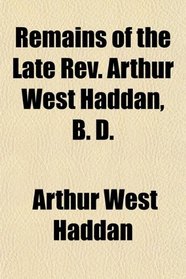Search -
Remains of the Late Rev. Arthur West Haddan, B. D.
Remains of the Late Rev Arthur West Haddan B D
Author:
General Books publication date: 2009 Original publication date: 1876 Original Publisher: J. Parker Subjects: Theology Religion / Christianity / Anglican Religion / Christian Theology / General Religion / Christian Theology / History Religion / Christian Theology / Systematic Religion / Christianity / General Religion / Theol... more »
Author:
General Books publication date: 2009 Original publication date: 1876 Original Publisher: J. Parker Subjects: Theology Religion / Christianity / Anglican Religion / Christian Theology / General Religion / Christian Theology / History Religion / Christian Theology / Systematic Religion / Christianity / General Religion / Theol... more »
ISBN-13: 9781150374425
ISBN-10: 115037442X
Publication Date: 12/22/2009
Pages: 428
Rating: ?
ISBN-10: 115037442X
Publication Date: 12/22/2009
Pages: 428
Rating: ?
0 stars, based on 0 rating




